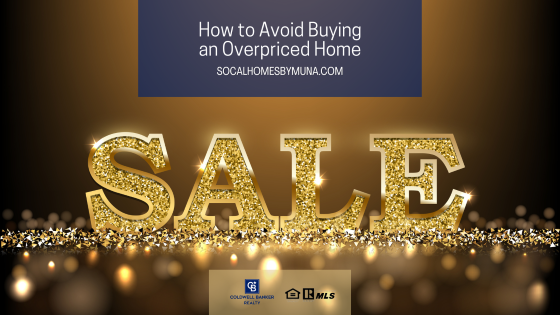Many of today’s Inland Empire home buyers search online at some point during their home-buying process. While prices may still be up from last year, buyer demand has cooled off a bit. That moved the Inland Empire real estate market to a more balanced state. Unfortunately, some sellers refuse to adjust their prices accordingly. They still believe that buyers are willing to pay whatever the seller wants no matter how crazy that price may be. Avoid overpaying for your next property by knowing how to identify an overpriced home.
How to Avoid Buying an Overpriced Home
How Long Has It Been on the Market?
The more days a property sits on the market, the higher the probability that price plays a big part in that. Realtor.com reported that Riverside homes spent a median of 49 days on the market before going under contract in July. Some experts believe that sellers should consider a price reduction if they see no action within the first three weeks. If you see a property listing that says it has been on the market for longer than this, there is a good chance that it is due to being an overpriced home.
But do not rely totally on a listing’s “days on market”. Most online listings include a history of when a listing has been on the market and for how much, including when price changes went into effect. Sometimes, a seller may withdraw their listing for a few weeks and relist it again so that it shows up as a brand new listing. If you see several listing dates within the past few months, this may indicate that the seller is asking too much for it.
What Are the Comps in the Area?
Ask your REALTOR® for a list of comps nearby. If they fall well below the list price of the Inland Empire home you are interested in even though they are similar in size, amenities, and location, it is probably overpriced. Confer with your REALTOR® about a realistic price to offer that falls more in line with other homes in the area.
Have Homes Around Them Sold Quickly?
If other homes in the neighborhood sold quickly but the one you are interested in has not, it could either mean that the asking price is too high or other buyers saw flaws that would be insurmountable (or too expensive) to overcome at the price the seller wants. Check out the days other listings in the neighborhood spent on the market and how much they sold for recently to determine whether or not overpricing may be the case here.
How Many “For Sale” Signs Do You See in the Neighborhood?
Finally, take a look around the neighborhood. How many “for sale” signs do you see? Hardly any or none at all typically means that homeowners are happy there. Dozens of “for sale” signs should throw up a huge red flag for you about how the homeowners feel about living there. It may also mean that sellers used an overpriced neighbor’s home to justify overpricing their own home. Let your REALTOR® do some digging to find out the truth.
Muna Dionne, your Inland Empire specialist with Coldwell Banker Realty


 Facebook
Facebook
 X
X
 Pinterest
Pinterest
 Copy Link
Copy Link
